The debut of our fully functioning hydrogen Hilux prototype in September 2023 demonstrated the breadth of technologies Toyota is applying in its progress towards carbon-free mobility. Now we are delighted to report that this ground-breaking project has moved into its final phase of development.
Ten fuel cell Hilux prototypes have been built at the Toyota Motor Manufacturing UK (TMUK) facility in Burnaston, Derbyshire. Five will undergo rigorous field testing to assess safety, performance, functionality and durability, generating test drive data in real-world situations. The other five are destined for customer and media demonstrations.
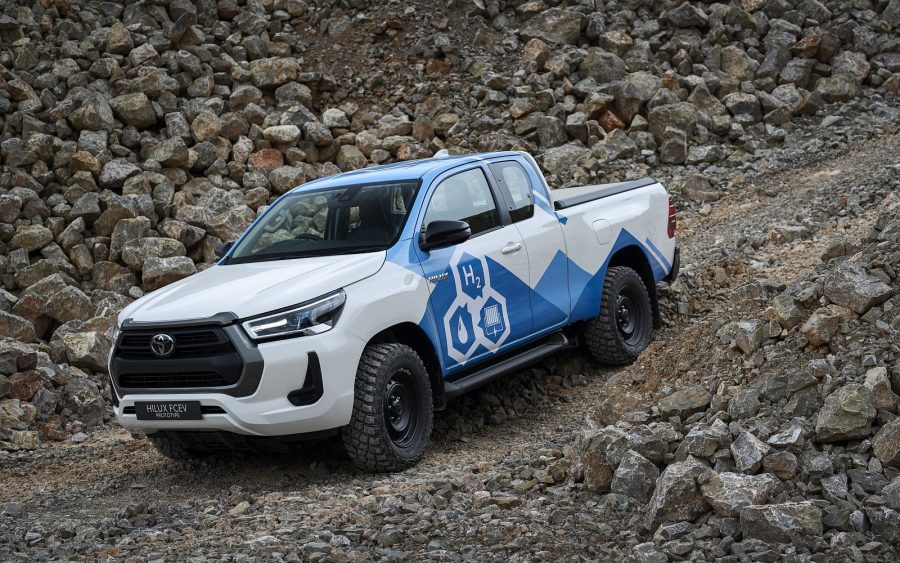
Know-how gained from the Hilux project will combine with Toyota’s 30 years of hydrogen fuel cell development and contribute to the next generation of fuel cell technology.
Hydrogen Hilux: vehicle profile
The hydrogen Hilux showcases how fuel cell technology can be integrated into a pick-up. Externally, it is the same size as a regular Hilux with an extra cab body. But beneath the surface, the chassis integrates core elements from the Toyota Mirai hydrogen fuel cell electric saloon – technology that has proved its quality in almost ten years of commercial production.
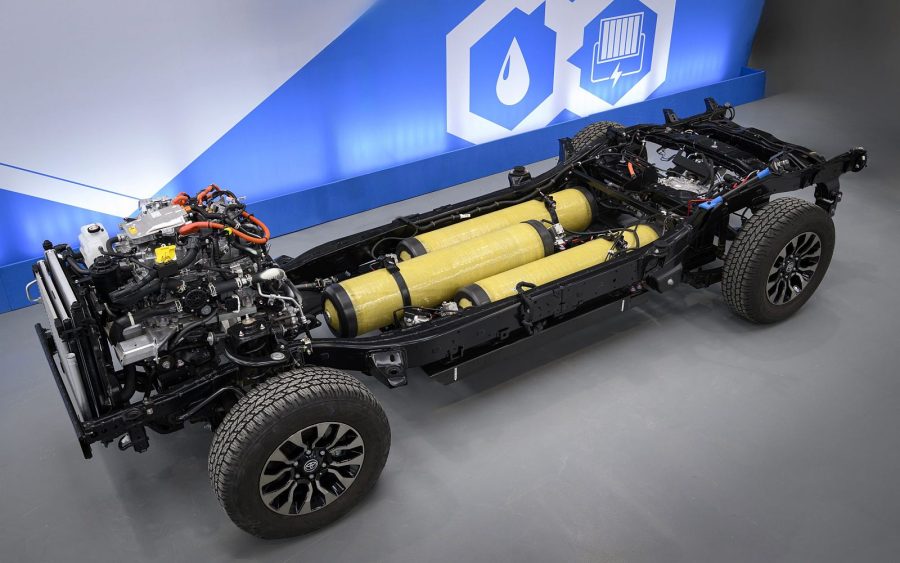
Hydrogen is stored in three high-pressure fuel tanks mounted within the vehicle’s ladder frame chassis. Each tank contains 2.6kg of liquid hydrogen to give a total capacity of 7.8kg, which is enough to offer an expected driving range of up to 373 miles. The polymer electrolyte fuel cell stack contains 330 cells and is mounted above the front axle. A lithium-ion battery in the rear load deck stores the electricity produced by the fuel cell, which in turn powers a 134kW (180bhp) and 300Nm e-motor on the rear axle. When driven, the fuel cell produces no tailpipe emissions other than pure water.
Hydrogen Hilux: provisional technical specifications
| FUEL CELL STACK | |
| Fuel cell type | Polymer electrolyte with 330 cells |
| Fuel cell power output (kW/bhp/DIN hp) | 128/172/174 |
| MOTOR GENERATOR | |
| Motor type | Permanent magnet, synchronous |
| Motor power output (kW/bhp/DIN hp) | 134/180/182 |
| Max. torque (Nm) | 300 |
| BATTERY | |
| Battery type | Lithium-ion with 84 cells |
| Capacity (Ah) | 4.0 |
| FUEL TANKS | |
| Number of tanks | 3 |
| Total capacity (kg) | 7.8 (3 x 2.6) |
| SUSPENSION AND STEERING | |
| Suspension | Double wishbone front, de Dion rear |
| Steering | Electric power steering |
| EXTERIOR DIMENSIONS | |
| Overall length (mm) | 5,325 |
| Overall width – exc. mirrors (mm) | 1,855 |
| Overall height (mm) | 1,810 |
| Front / rear track | 1,570 / 1,570 |
| Wheelbase | 3.085 |
Project history
The hydrogen Hilux project began in early 2022 with a feasibility study undertaken by TMUK and Toyota Motor Europe with consortium partners Ricardo, European Thermodyamics, D2H Advanced Technologies and Thatcham Research. Funding was subsequently gained from the UK government facilitated through the Advanced Propulsion Centre. Additional support was also provided by Toyota Motor Corporation.
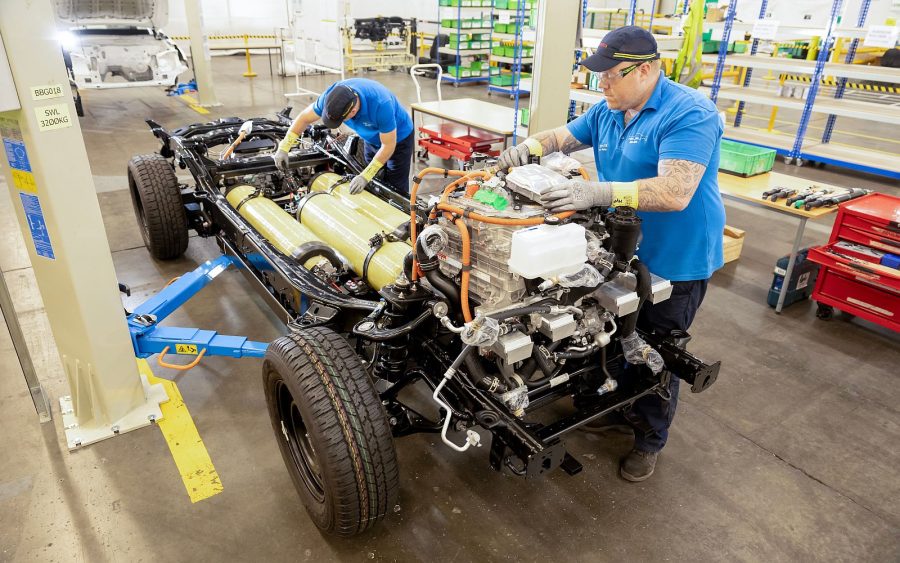
An intense design and development programme commenced in July 2022. But it wasn’t until June 2023 that construction of the prototype actually began, with work taking place in a dedicated area within TMUK’s Burnaston facility. Using efficient Toyota Production System principles, the first vehicle was completed just three weeks later. The nine additional vehicles were built by December 2023.
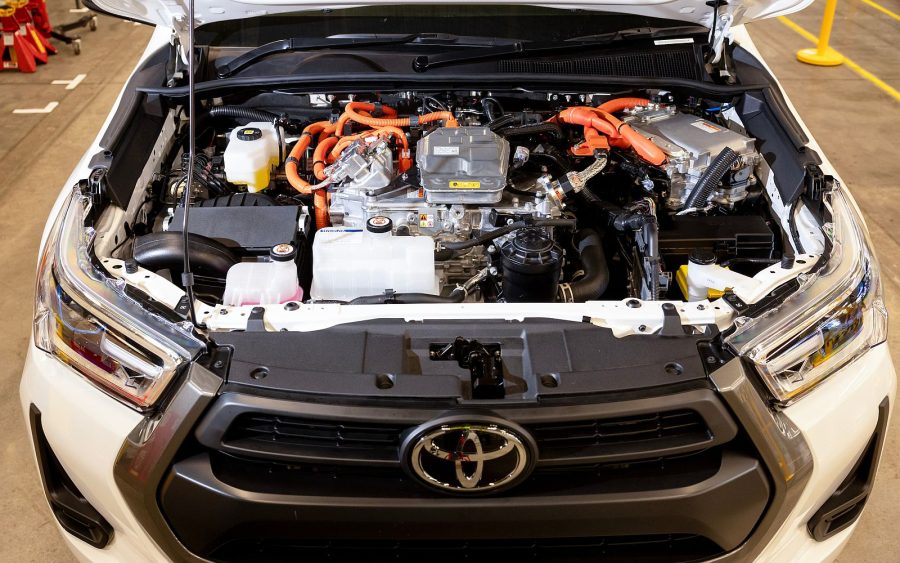
What will next-generation hydrogen technology look like?
Toyota’s industry-leading research and development in hydrogen fuel cell technology led to the launch of the original Mirai in 2015. Five years later, the next-generation Mirai introduced second-generation technology, which extended the car’s driving range by 30% to around 400 miles. It is this technology that underpins the hydrogen Hilux.
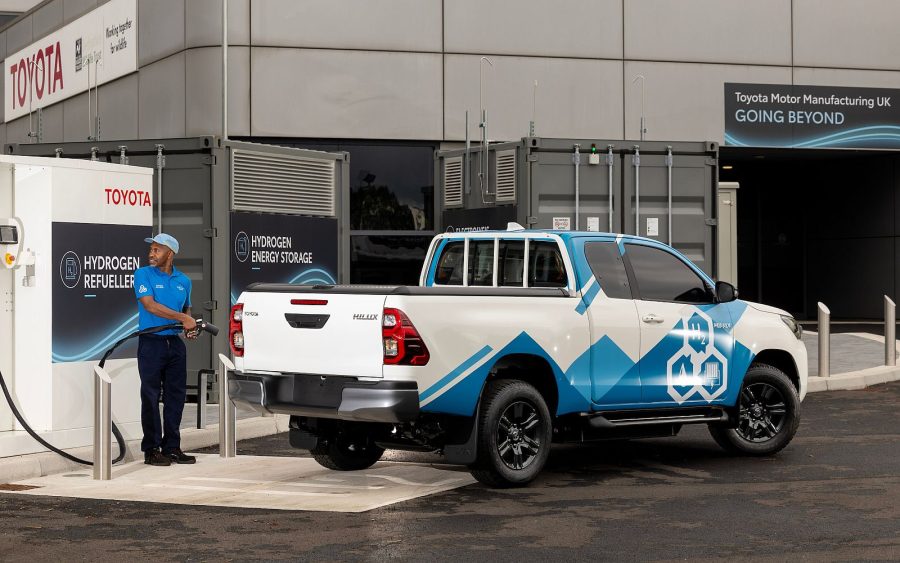
However, third-generation fuel cell technology is currently under development. It represents a key element in Toyota’s plan for expanding hydrogen usage, with sales scheduled to commence in 2026-27. These units will have a higher power density and enable an expected 20% increase in vehicle driving range, while technical advances and increased production volumes could help to reduce costs by more than one third.
Research is also progressing on the potential of creating scaleable fuel cell stacks with different power outputs. Toyota engineers are also looking at making fuel tanks with shapes more complex than the existing cylinders, which will make the technology more compatible with different size vehicles.
Learn more: How do hydrogen fuel cells work?
This article, originally published in December 2022, was updated in September 2023 and June 2024 to reflect the latest project developments.
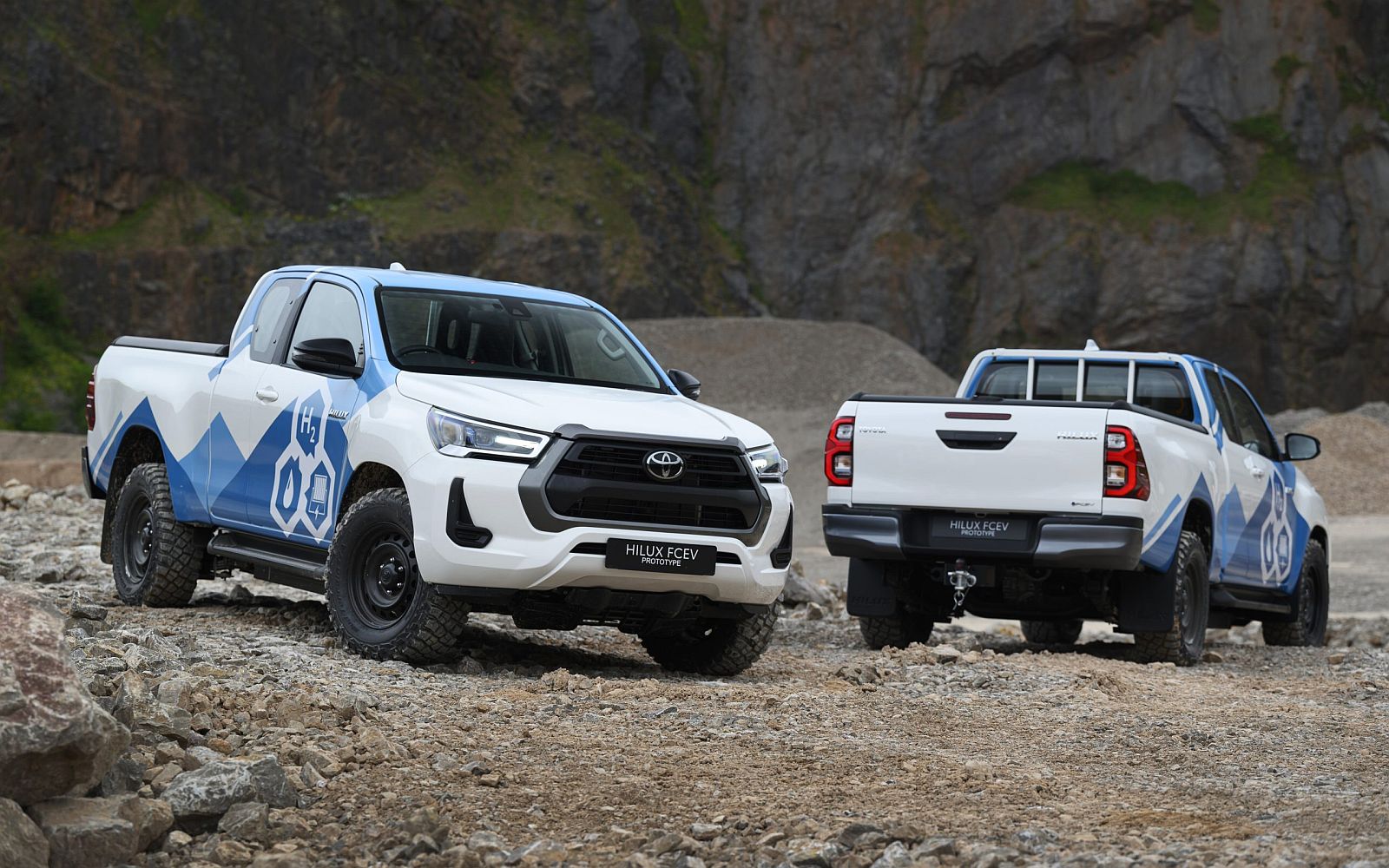
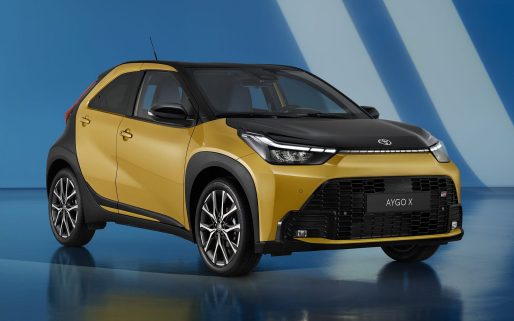

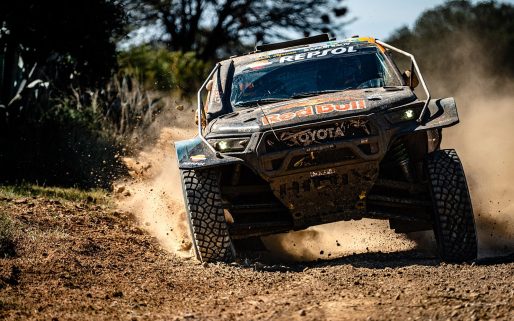
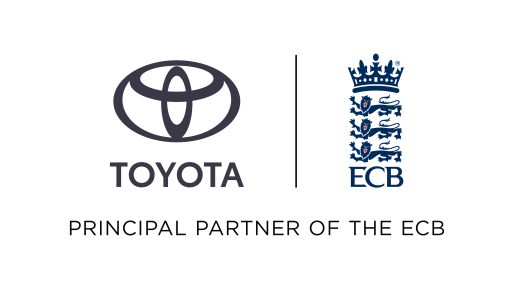
Great project, I’m looking forward to seeing this zero emission vehicle. I’ve a 2022 Hilux and would buy one of these as soon as available
I would like to be kept in the loop about release dates and prices etc please..
Hi David,
Thanks for your comment.
Please keep an eye on our blog and social media channels for the latest information on our vehicle offerings.
Thanks.
If the infrastructure was there I would buy a Mirai. I have just bought a new Camry and love it.
So please push to get hydrogen in our filling stations. Toyota Uk said this would be done by 2019 when the Mirai was launched in 2015.
In my opinion, Toyota’s hydrogen strategy is absolutely right.
Companies that invest only in batteries will later find out that they were wrong.
Very impressed. If you’re looking for a trialist then I’m your man. I have a farm in Cornwall with a 3 phase off grid (solar and wind) renewable set-up. I also draw water from a natural spring.
It might make a nice test case for you to show a fully green solution by producing green hydrogen on the farm and then using it in a pick-up.
Let me know 🙂
Shrewd man👌🏻
I assume or do so hopefully, all you need to do is fill her up with water 💦 and then electrolysis separates the water to hydrogen gas and away you go? 🤔 It’s about time have been saying for years this is what needs to be done! But the government doesn’t like it because of all the fuel revenues! 😉 I have a diesel hilux and if this is anything to go by then bring it on! 😁
I’ve got a 2021 Hilux invincible, which is my first Toyota and pickup. I just love this vehicle and brand.
I would buy a hydrogen pick up in a heartbeat, when available.
I heard about this in Farmers’ Weekly. Thank goodness that the agricultural sector is pushing forward with a practical alternative to diesel. I’m no farmer but hydrogen rather than electric is what I’ll need to power my 4×4. Toyota et al, keep going with this. Imagine, water powered fire engines!
That’s great news, any chance of being on the list for one of these units.
When and where are the test days on for them in the UK ?
Keep up the great work Toyota, become the leader and not the follower.
Hi Brendon, thanks for your interest.
We have no information on this at the moment. Please keep an eye on our blog and social media channels for the latest updates.
Thanks.
Are the diesels compatible with HVO bio diesel
Wouldn’t that be a good option for agricultural users??
Hi, thanks for your question.
Our Technical Team have advised that it’s not something we recommend, as our vehicles have only been approved to use those fuels mentioned in the Owners Manual.
Thanks.
Strange!! I read something in the press that the 2023 model year would be compatible
It’s available wholesale from some fuel companies for fleet use and at some pumps in Europe..
Thanks, so is it just the European spec that can run on HVO ? As per Toyota EU press release?
They say the pro ace range are compatible now and the land cruiser and Hilux 1st quarter of 2023 production
Hi,
We cannot comment on other markets.
Thanks.
I spent over 30 years in the motor industry and for the last 20 of those the Toyota brand stood out for reliability and low maintenance. I left the industry in 2008 and am now just retired but have kept an eye on the brand and the work in Hybrid self charging technology is market leading. I drive a 2020 Hilux Invincible and love every mile. Can’t wait to see the Hydrogen model on the road.
Hi Fred, thank you for your feedback.
We appreciate your kind words and loyalty to Toyota. We look forward to seeing what the future has in store for hydrogen as well!
Many thanks.